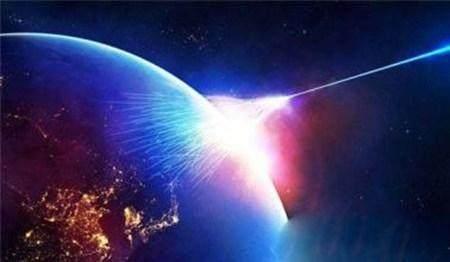(单词翻译:单击)
听力文本
This is Scientific American — 60-Second Science. I'm Lee Billings.
Take any square kilometer of Earth's surface. About once a year an extraordinary event occurs in the sky directly above that patch of land or sea: the hefty nucleus of a heavy element slams into the top of Earth's atmosphere at close to the speed of light.
Scientists have been unable to tell where these particles come from, in part because their trajectories can be nudged by galactic magnetic fields. Another puzzle is how the particles reach such blistering speeds.
Two theories dominate attempts to explain these mysteries. One posits that the particles mostly come from exploding stars and other high-energy phenomena in our galaxy. The other speculates that the particles are produced beyond our galaxy—perhaps in the active cores of other galaxies surrounding the Milky Way. Now a study in the journal Science supports that second notion.
Amazingly, any of these "ultra-high-energy cosmic rays" has the kinetic energy of an apple falling from a tree to the ground. That means that Isaac Newton, or you, would definitely feel it hit your head.

Luckily, that never happens. Instead, when these cosmic speed demons strike our atmosphere they create a brief flash of light, as well as high-altitude "air showers" of less-energetic particles that harmlessly dissipate.
In the new study, an international team of more than 400 researchers analyzed a dozen years' worth of these events. They used the Pierre Auger Observatory, a Rhode-Island-sized array of telescopes and 1,600 particle detectors operating in western Argentina, to record air showers from more than 30,000 ultrahigh-energy cosmic rays. And it turns out that most of the particles appear to come from a broad, relatively galaxy-rich region of sky located about 90 degrees away from the Milky Way's center. Which suggests that they arise in faraway galaxies perhaps from spinning supermassive black holes, rather than anywhere closer to home. What a long, strange trip they've made.
Thanks for listening for Scientific American — 60-Second Science Science. I'm Lee Billings.
参考译文
这里是科学美国人——60秒科学。我是李·比林斯。
用地球表面任意一平方公里来举例。每年,这一片土地或海洋的正上空都会发生一次不同寻常的事件:重元素的超重原子核会以接近光速的速度撞击地球大气层上端。
科学家一直无法弄清这些微粒从何而来,部分原因是微粒的飞行轨道会被银河磁场推动。另外一个谜题是这些微粒是如何达到如此猛烈的速度的。
这些谜题主要有两种理论解释。其中一种假定微粒大多来自银河系中的爆发星和其它高能现象。另一种理论推测微粒来自于银河系之外,可能是由银河周边星系的活跃核所产生。现在,《科学》期刊上的一项研究为第二种观点提供了支持。
令人惊奇的是,任何一种“超高能宇宙射线”都有苹果从树上落地那样的动能。也就是说,艾萨克·牛顿或你都一定会感觉到射线撞上了你的头部。
幸运的是,这从未发生过。而相反的是,当这些超高速射线冲击大气层时,会产生一瞬间的闪光,以及低能粒子的高空“宇宙线大气簇射”,这种簇射无害且很快会消散。
在新研究中,一个拥有400余名研究者的国际团队分析了12年间所发生的此类事件。他们用皮埃尔·奥格天文台记录了3万多次超高能宇宙射线产生的空气簇射,这一天文台位于阿根廷西部,其望远镜阵列的占地面积相当于罗德岛的大小,而且还运行着1600台微粒探测器。结果发现,大多数微粒似乎来自一个宽阔且星系相对较丰富的太空区域,该区域位于银河系中心90度位置。这表明,这些微粒来自遥远的星系,或许来自旋转的超重黑洞,而不是任何靠近地球的地方。可以想象,这些微粒经历了多么漫长而陌生的旅程。
谢谢大家收听科学美国人——60秒科学。我是李·比林斯。
译文为可可英语翻译,未经授权请勿转载!
重点讲解
重点讲解:
1. slam into 猛烈撞击;
例句:During rush hour, he saw a car veer off the road and slam into a fire hydrant.
在交通高峰时,他看到一辆车在马路上转弯,撞到消防栓。
2. in part 在某种程度上;部分地;
例句:It is selling very well, in part because the packaging is so attractive.
这个卖得非常好,部分原因是包装非常吸引人。
3. turn out 原来是;结果发现;
例句:It turned out that my worries were justified.
事实证明,我的担心不是多余的。
4. rather than 而非;胜于;而不是;
例句:They wait for the group to decide rather than making individual decisions.
他们等待团体作决定而不是各自作出决定。


